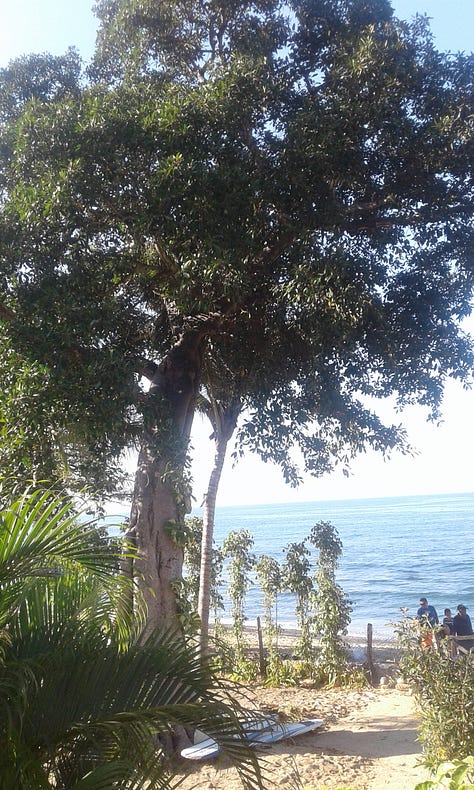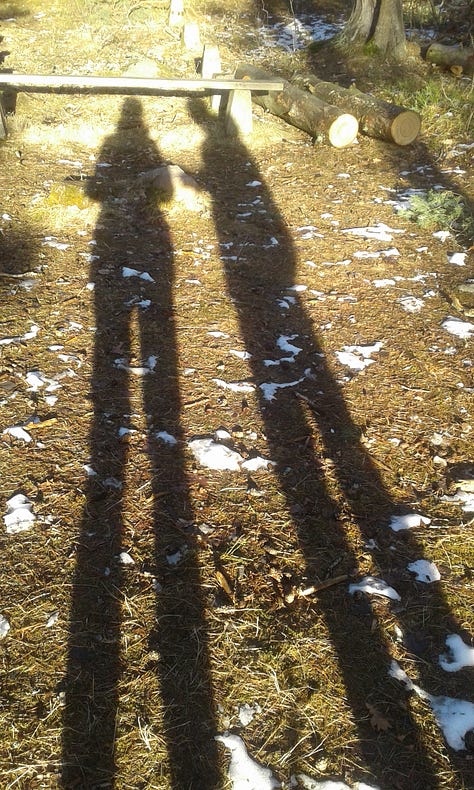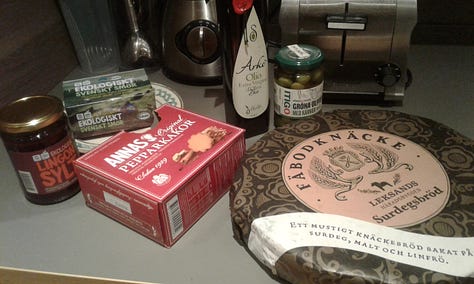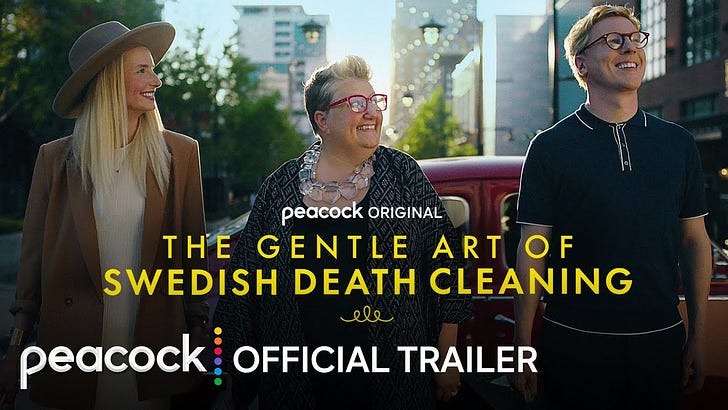This post is especially for those of you currently in the Northern Hemisphere, in the MYOGA Season Deepest Winter with a focus on death and rebirth.
In early 2017, I spent 6 weeks pursuing a love interest in Sweden. I met this tall, dark and handsome man in Mexico at an artsy New Year’s party where I felt very out of place. I only knew my Air BnB host who had taken me along last minute. Avoiding the noise, I wandered out to the goldfish ponds where he and I caught eyes and were magnetically compelled to cross the waters between us to connect in the candlelight. He was quite sturdy, having played (oddly enough) American football, yet my ardour literally bowled him over which left us in a laughing heap in the hedges.









Due to his African roots, I didn’t believe he was Swedish, which made me realize my own racism. He was a complete stranger so I had no way of checking his goodness, and even though I didn’t speak Swedish I asked him to say something so I could ascertain his honesty. Pretty quickly though I trusted him enough to join him and his friend on their surfing holiday on Mexico’s Pacific coast. Sayulita was swamped with sewage so we relocated from Puerta Vallarta to Quimixto, which could only be reached by boat.
Things progressed quickly and, after making my scheduled return to NZ, I redeemed my air miles to join him in Sweden. February in Stockholm is the dead of winter, which I figured would give me the bleakest view and if I found some joy in those dark days, then the brightest view must be brilliant!
If only I could have taken that view of him, too.
Truth was, his home needed a dose of döstädning. Heaven knows I tried to help out with a bit of organizing, which I realize now was not my business to take on. I’ve had a lifelong habit of sorting other people’s shit, which stemmed from childhood exposure to the chaos of clinical craziness and reactively (or perhaps instinctively), if not compulsively, needing to group “like with like” for my own sanity.
Organization and order became a life raft in a sea of shit. What I didn’t have at the time I was in the homeland of döstädning, was “the gentle art of” it.
As junk drawers make me queasy and overpacked pantries make me twitch, my lifelong need to seek order amongst chaos was well-met in the life circumstances of my soul-sister. We met at my studio in Wellington when she was in the midst of decades of doula-ing the dying. Her father had gone before (as had mine, and we had that in common), but it was her mother’s mother I met at her dying bed. And then it was her mother I looked after in her dementia. Those moments of me getting-to-know her family were only drops in the big bucket of caring service she devoted to them.
And not just caring for the people, but managing the stuff they left behind. Below is some writing from ages ago about the disease of stuff, stuff, stuff and it’s relation to dying and death that I recently re-posted, in case of interest.
planetary stripdown & personal leavetaking
Re-Post from 12 December 2015 — that was nearly 8 years ago now… My dear friend Lindsay got frustrated with her Buddhist practice’s lack of action in a world that needs such a conscious and kind approach. In the past 2-3 years she shifted gears and has been on the front lines of climate change action in London, Paris, and now at
Over the recent holy days I learned how to use the TV here in Australia where I’m house/cat sitting (and studying environmental science). I know, I know, you’d think if I had the brains to go to grad school I could figure out a remote and a zillion channels of mind-numbing “programming” but, no, I was hesitant to “get stuck in”, as Kiwis say, to the machine.
So to balance my hesitation I watched my first Charlie Chaplin movie, Modern Times, where he gets stuck in the machine. Brilliance.
Then I stumbled upon (my usual method of divination is stumbling) a series called The Gentle Art of Swedish Death Cleaning.
Now I know there’s a word for what I’ve been attempting to do all these years with my own copious collections, as well as with the remains of others’ lives. I love that about words—there’s usually one for just about anything, though it might be in a different language than the native tongue, or it might need to be invented. We have that power!
Döstädning is the power of embracing life while you’re living by clearing the debris, the dross, the dead weights. On the show 3 gleaming Swedes, with their inimitable accent, play their parts of organizer, psychologist, and designer. They interweave with one another throughout, but roughly we see the rhythm of reworking one’s things in that order -
assess the mess and re-organize it as needed,
assess why the mess is what it is and address the psychological underpinnings that got you there in order to re-set one’s approach to living and dying,
and, with all that in hand, re-design the spaces you live (and may even die) in.
As I mentioned, I didn’t have the gentle part of it. Probably still don’t have it, truth be told. Which explains why some have called me Commander and described their time with me as “Billington’s Bootcamp”.
Gentle is more of an antechamber that my thoughts, words, and actions need to go through to get suited up (or de-suited, dis-armed) in order to survive human interactions. Honestly, I’ve done well with German and Dutch folk whose language, and therefore manner, tends to be more brusque, to the point, and honest.
So when I was met by my Swedish lover’s mess of past lives spilling from drawers, ex-wife banging on doors, and us sleeping on floors (nicely rhymed now but disharmonious then), I put my efforts into the cleaning part. The rest I couldn’t address. As I said, I realized too late that even the cleaning part wasn’t mine to address.
No, I wasn’t as gentle as these professionals. I was judgmental because I was triggered, meaning my own past was being brought up and mirrored in this situation. Also, I was hurt, meaning my expectations weren’t met. And we all know that having expectations in the first place is a sure-fire way to have them disappointed! I was taking personally where he was in his life, which was both right and not right. Not right because it was his life and his mess to attend to. But right because anything I experience is a mirror of me, to some degree.
While I was not the one to attend to my dead father’s things, my brother Sam described the mess he dealt with and I’m sure it was part of what dragged him down in his own life. All of our father’s cryptic scribblings were interspersed with the detritus of living in a body, like chicken bones from dinners not disposed of. Not to mention the rest of the flotsam and jetsam of our father’s last years in a one-room cabin without a toilet on the Oklahoma edge of Arkansas. What loved ones (or even difficult relations) leave behind is not only the memories of our times with them, but their physical weight of all their things.
Döstädning is a gift we give ourselves while we’re alive, and a gift we give our relations once we’re gone. Because we love ourselves we don’t live with unresolved issues that exist in our tissues—our own bodies as well as the material bodies in our immediate environment. We consciously choose what surrounds and supports us. And because we love them, our relations, we don’t leave them with our shit either. We give them our gift of conscious living. Which means we are also facing up to the inevitable end, the leaving of this life.
I so admire both the pragmatic approach to our only guarantee in this life - that we will leave it - and the gentleness the Swedish Death Cleaners couple to the task.
There’s a Laurie Anderson story in her album The Ugly One with the Jewels that describes a woman who loved men with guns that got Laurie to thinking how a military approach to psychoanalysis would be really helpful and effective. “Listen, worm, if you don’t get your shit together by 0800 hours, you are dead meat…” Even as Sergeant, Laurie’s signature vocal pacing comes through. The little snippet I’m referring to can be heard at 2:30-2:57 minutes.
So, yes, I’ve been more of a military sergeant than a gentle accomplice, which makes sense when I consider my immense ancestry of military men and my own supposed past lives, all as military men - foot soldiers and sailors. If this is my first life as a woman, it is apparent in how ruthless I can often be when it comes to getting one’s shit together.
I’m more of the Jiddu Krishnamurti clan of thinking that Freedom is Now. Change is immediate, and self-determined.
It’s about habit and the discipline to change habits for a cleaner life. Obviously awareness is first required to see what’s what. Certainly compassion and empathy help to soften the process, and to keep from cultivating more negative karma that boomerangs out into the future to greet us again.
But it’s also possible, and I have seen it intimately in close relations, how steeping in the sad story only perpetuates the sad story. Just so with a bright and lively story, or one of renewal or peace. Whatever it is, is repeated. So awareness is key.
The awareness I gained in circumnavigating the globe in search of my mate and coming up against mirror after mirror of my own mired-in mess, is that I am married to Spirit. It is only when I stick to my vows of constancy to the Divine that I am truly met and truly free.
Now, back to the perpetual task of saucha, the yogic ethic of cleanliness. If saucha is a new term to you, here’s a great post on this yogic ethic or niyama, by my dear friend Kara-Leah.
It’s a never ending story of evaluating what-is, determining what feels best to surround myself with by paying attention to what lifts and what drags, and then to organize and design (again and again, as necessary) both the external and internal spaces that I occupy.
Gentleness comes in the form of the necessary stick-to-it-iveness required to live cleanly, as well as in the acceptance of oneself, Others, and circumstances. Gentleness and joy are what enable us to live life with compassion. And, when it comes time, to die with less debt.







Love this storytelling, thank you Melissa. This helped me to reframe my recent move following a breakup. I felt this in my bones... leaving everything behind that no longer served me including my actual self haha. Now having an entire house full of stuff that I choose to keep here. I think I’ve added weekend organizing to my spiritual practice. Thank you for sharing.